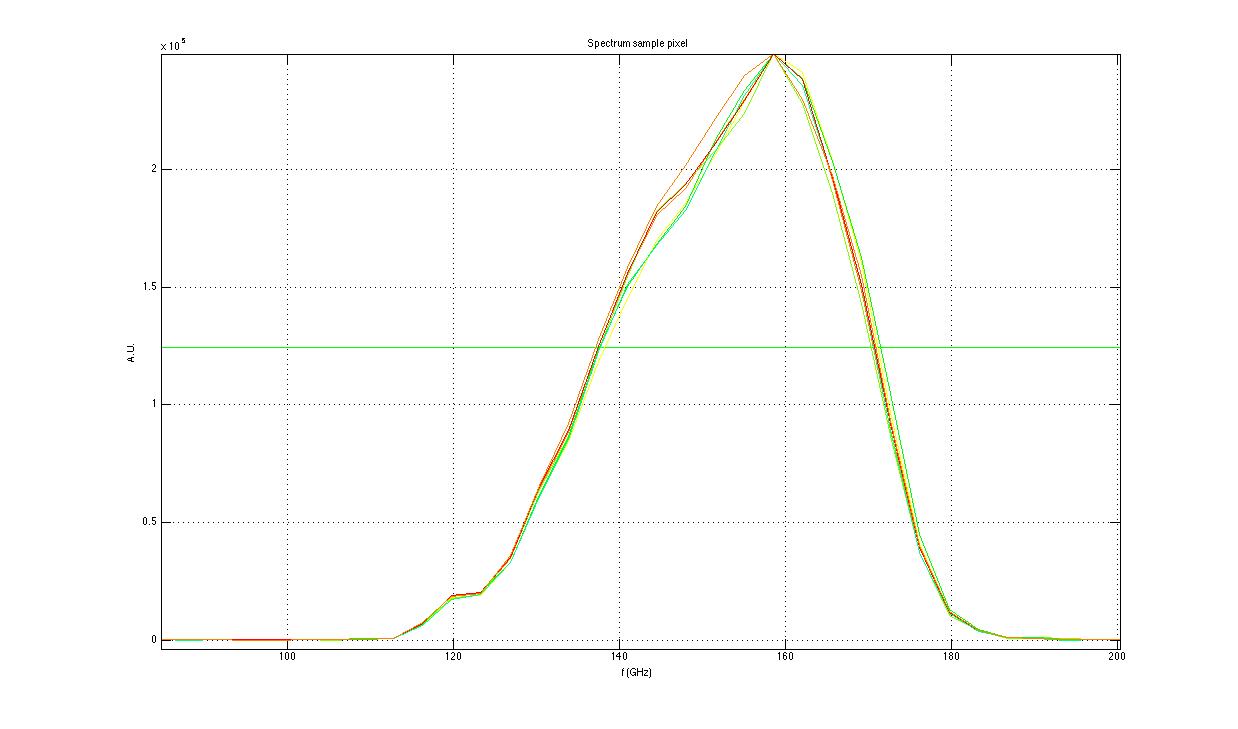240 GHz band
Array: unchanged, still NICA 8e, 20nm Al IRAM. LO 1.95GHz, power per tone -50dBm (at cryostat input).
Pixels: pitch 1600 x 1600 micron. 224 pixels on design (16x16 array minus the corners). About 190 useful pixels.
Cold electronics: SiGe Caltech amplifier "Florence" (gain 40dB, 1dB compression point 0dBm integrated power, Noise T around 6K).
Warm electronics: NIKEL01. RF source 192.168.1.196 (IFR 2024 Leasametric). 0dB attenuation at cryo IN. DAC 2, niv 3. VLF2500 low-pass filter at cryostat input.
Spectrum: peaking at 240 GHz.
Figure: Response spectrum measured in Grenoble on the 240GHz array used for run4-5-6.
Please find below the data for the spectrum on the pixel 1 (frequency(GHz), Response (AU)):
150 GHz band
Array: NICA8f1, 18nm Al film made at IEF, litho PTA. LO 1.35GHz, power per tone -54dBm (at cryostat input).
Pixels: pitch 2305 x 2305 micron. 132 pixels on design (12x12 array minus the corners). 129 identified resonances, at least 125 useful pixels.
Cold electronics: SiGe Caltech amplifier SN 84 (unchanged), (gain 40dB, 1dB compression point 0dBm integrated power, noise T around 4K).
Warm electronics: NIKEL02, RF source 192.168.1.192 (IFR 2025 IRAM), 3dB attenuation at cryo IN, starting DAC 2, niv 3. VLF2250 at cryostat input.
Spectrum: peaking at 155 GHz.

Figure: Response spectrum measured in Grenoble on the 150GHz array used for run 6 (FWHM=135-170GHz).
Please find below the data for the spectrum on the pixel 1 (frequency(GHz), Response (AU)):
102.16,449.8
105.68,364.14
109.21,790.38
112.73,860.81
116.25,7672.5
119.77,18558
123.3,20032
126.82,36197
130.34,65947
133.87,92085
137.39,1.2775e+05
140.91,1.5821e+05
144.43,1.8406e+05
147.96,2.0142e+05
151.48,2.217e+05
155,2.4001e+05
158.53,2.49e+05
162.05,2.2948e+05
165.57,1.9754e+05
169.09,1.5482e+05
172.62,93405
176.14,40109
179.66,12269
183.18,4264
186.71,1265
190.23,863.01
193.75,412.25
197.28,258.72
200.8,317.51
